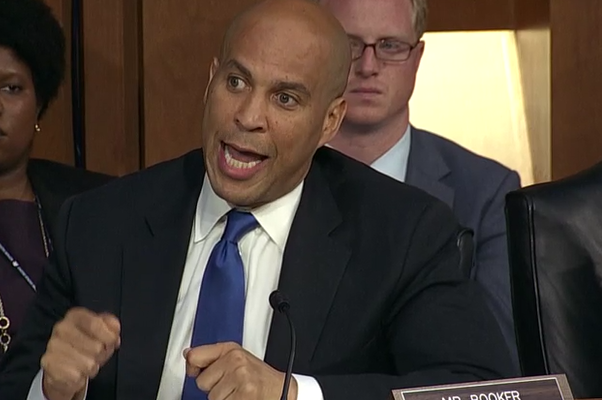Booker Questions White House Counsel’s Claim of Executive Privilege and Whether “Missing Witness” Rule Lets Senator Draw an Inference against White House from Blocking of Key Witnesses During Q&A Period of Impeachment Trial

Booker Questions White House Counsel’s Claim of Executive Privilege and Whether “Missing Witness” Rule Lets Senator Draw an Inference against White House from Blocking of Key Witnesses During Q&A Period of Impeachment Trial
WASHINGTON, D.C. – During the impeachment trial of President Donald J. Trump in the Senate today, U.S. Senator Cory Booker (D-NJ) asked the House managers about the White House Counsel’s claim of executive privilege and whether the “missing witness” rule—allowing jurors in court cases to draw an inference when a party blocks a witness from testifying against them—ought to apply to the White House blocking key witnesses and documents from being presented in trial.
“Even if a communication or a document is covered by executive privilege that privilege can be overcome by showing the evidence is important and unavailable elsewhere. On January 22, while this trial was underway, President Trump said, ‘I thought our team did a very good job. But honestly, we have all the material. They don’t have the material.’ Can you comment on whether executive privilege allows a president to conceal information from Congress, particularly if the evidence cannot be obtained elsewhere?” Booker asked.
Senator Booker’s question aims to inform the American people on how executive privilege works. The White House has relied on the mere possibility of claiming executive privilege to deny access to critical witnesses and documents in this impeachment matter. Executive privilege is not absolute. Even if a communication or document is covered by executive privilege those materials may still be ordered to be produced.
When President Trump said, “we have all the material…they don’t have the material,” he admitted a critical fact that may ultimately require the evidence to be disclosed. President Trump’s blanket refusal to provide any witnesses or documents to Congress could undercut any effort he might make to claim executive privilege over the very materials he is withholding. His boasting about having “all the material,” and the House managers’ lack of access, underscores that point.
“The ‘missing-witness’ rule—which dates back to 1893 Supreme Court case Graves v. United States—allows one party to obtain an adverse inference against the other for failure to produce a witness under that party’s control with material information. Here, one party, the President, has prevented witnesses within his control from testifying or providing documents. Do the House managers believe Senators should apply the missing witness rule here, and if so, what adverse inferences should we draw about this testimony and documents?” Booker and his Senate colleagues Whitehouse, Coons, Klobuchar, Leahy, Markey, Peters, and Udall asked.
A longstanding legal rule known as the “missing witness” rule permits a jury to draw an “adverse inference” against a party if that party blocks testimony from individuals under his or her control and those witnesses have material information. A similar legal rule allows a jury to draw a negative inference against a party for willfully failing to produce relevant documents under his or her control.
The President has indiscriminately and categorically prevented the production of witnesses and documents during the House impeachment inquiry. This includes witness testimony from Acting Chief of Staff Mick Mulvaney and former National Security Advisor John Bolton. It also includes documents from the Office of Management and Budget that would provide insight into the claim by President Trump’s lawyers that he was merely concerned about corruption in Ukraine when he withheld security assistance to that country.
###










